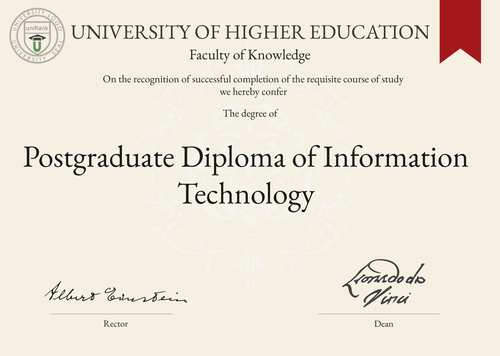
Postgraduate Diploma of Information Technology (PGDIT)
Guide to Postgraduate Diploma of Information Technology Program/Course/Degree
Postgraduate Diploma of Information Technology (PGDIT)

Program Name:
Postgraduate Diploma of Information TechnologyProgram or Degree abbreviation:
PGDITDuration range:
1-2 yearsTuition range:
Varies depending on the country and universityOverview:
The Postgraduate Diploma of Information Technology (PGDIT) is a comprehensive program designed to provide students with advanced knowledge and skills in the field of Information Technology. This program is suitable for individuals who already have a background in IT and wish to further enhance their expertise.Curriculum Overview by year:
The curriculum of the PGDIT program is structured to cover a wide range of topics related to Information Technology. In the first year, students will focus on core subjects such as programming, database management, network security and software development. The second year offers more specialized subjects, including data analytics, artificial intelligence and cloud computing.Key Components:
- Programming languages and software development - Database management and administration - Network security and cyber defense - Data analytics and artificial intelligence - Cloud computing and virtualizationCareer Prospects:
Graduates of the PGDIT program can pursue various career paths in the IT industry. They can work as software developers, database administrators, network security specialists, data analysts, or IT consultants. The demand for IT professionals is constantly growing, providing ample job opportunities for PGDIT graduates.Salary Expectations:
The salary expectations for PGDIT graduates can vary depending on factors such as location, industry and level of experience. On average, professionals with a PGDIT degree can earn competitive salaries, with the potential for growth as they gain more experience and expertise. For a more accurate understanding of salary expectations, you can utilize the Job Sites Search Engine, from our sister site jobRank, which searches over 4,600 job sites worldwide. Make sure to specify not only the job title but also the country you are interested in.Conclusions:
It is important to note that the duration, tuition fees, curriculum, key components, career prospects and salary expectations of the PGDIT program can vary depending on the country or location where you choose to study, as well as the university you select. Therefore, it is recommended to research and compare different options to find the best fit for your individual needs and goals. Visitors interested in pursuing a Postgraduate Diploma of Information Technology can use the uniRank World Universities Search Engine to find universities offering this specific degree program anywhere in the world. This search engine provides a comprehensive database of universities, allowing you to explore various options and make an informed decision about your education.World Universities Search Engine
search for Postgraduate Diploma of Information Technology (PGDIT) and add the Location (country, state etc.) or specific University you are interested in studying at.
Query examples:
- Postgraduate Diploma of Information Technology (PGDIT) United States
- Postgraduate Diploma of Information Technology (PGDIT) United Kingdom online
- Postgraduate Diploma of Information Technology (PGDIT) Australia international students
- Postgraduate Diploma of Information Technology (PGDIT) University of California
- Postgraduate Diploma of Information Technology (PGDIT) University of London tuition fees
- Postgraduate Diploma of Information Technology (PGDIT) University of Sydney scholarships
Share Program/Course
Interesting? Share this program/course/degree info with your friends now.